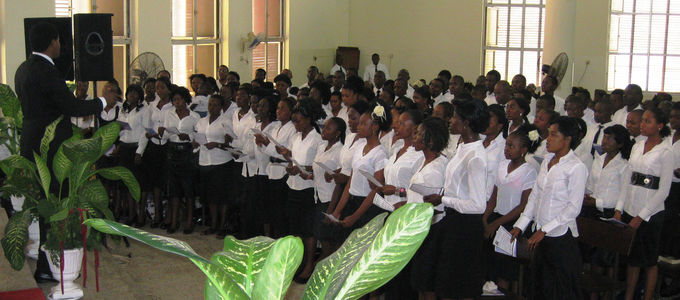
Every day the Chief Apostle prays for persecuted Christians. And one of the countries he has in mind is Nigeria. This coming weekend he will celebrate a divine service in Nigeria, a country being ravaged by Boko Haram, a militant Islamist group.
“They are real survivors,” Apostle Volker Kühnle says about the people of Nigeria. He is familiar with the country and its people from 15 years of pastoral care work. He is responsible for the approximately 290,000 New Apostolic Christians there. “The Nigerians are mostly a fun-loving people despite all the problems they have gone through,” he says, thinking about all the ordeals the country has been through from the Biafra war, to military rule, and now Islamist terrorism.
A knack for business
Nigeria with its 180 million people is Africa’s most populous country by far. The country has vast oilfields, but the majority of the people are desperately poor. A knack for business helps in the battle to survive. “They are the most ingenious people I know,” the Apostle says cautiously, because he is also aware of some of the Nigerian scams.
Peter Gfeller, the later Apostle, got a taste of this knack for making money when he laid the foundation of the New Apostolic Church in Nigeria in the 1970s. He was a Priest then and had his trouble with four Deacons who prevented members from attending services because they would not pay them a salary for the work they were doing in the congregation.
Numerous religious denominations
“We don’t do that,” Apostle Kühnle says. He is not unfamiliar with such demands. Such expectations can still be found at the congregational level on occasion today. Nigerians are a believing people. The population is equally divided between Islam and Christianity, and then there are traditional religions. “Everybody believes in something.” There are hundreds if not thousands of Christian denominations alone. Many are organized into individual churches and pay their leaders, pastors, or parish priests. “That does not make it easy to win ministers for our Church and hold on to them considering they are not paid.”
The co-existence between the various denominations is peaceful, if a little loud at times, the Apostle says and smiles. Especially in the bigger cities there is a lack of church buildings so that the various denominations rent quarters. It can happen that eight denominations worship on four floors of the same building, and all at the same time. “All of them with microphones and amplifiers.”
Missionary work by two district churches
When he began to work in Nigeria, Volker Kühnle sometimes came upon two New Apostolic congregations in one place. This was even the case in small villages. This curious situation resulted from the way missionary work was done at the time. Two districts had actually started to establish the New Apostolic Church in Nigeria at the time: a district from Germany (Hesse) and Canada. In the year 2001 the New Apostolic congregations in Nigeria were placed under the care of the New Apostolic Church Southern Germany.
Apostle Kühnle was responsible for the pastoral care work in Nigeria until the end of 2015. The local Apostle Geoffrey Nwogu will now be entrusted with this task. He is 57 years old and a medical doctor, and runs a clinic for gynaecology and general surgery. The handover had been planned for the beginning of last year, February 2015 to be exact. But the Chief Apostle had had to cancel any travel plans at the time because of the Ebola outbreak.
Persecution of Christians
Locals usually have easy access to places and people, but when it comes to the north of the country it becomes extremely dangerous even for them—also for Apostle Nwogu. Suicide attacks, mass abductions, and other atrocities are the order of the day. Responsible for these attacks is Boko Haram, a militant Islamist group who is threatening Christians, among others.
“This also affects us,” Apostle Kühnle reports. Buildings have to be secured with barricades against car bomb attacks. Ministers are abducted right out of our churches and killed. People are afraid. Alone in the city of Maiduguri we have lost nine of eleven congregations. “And we are a small denomination and are not even in the focus all that much,” he says, adding that the situation is far worse for Catholic churches.
The Apostle does not want to go into any details. “We preach forgiveness and reconciliation. I don’t want to stir up emotions.” It would make things even worse for our brothers and sisters. “The Christian commandment that requires that we forgive our enemies gets an entirely different meaning here.”




































